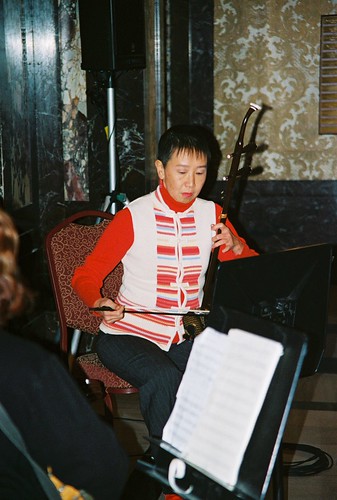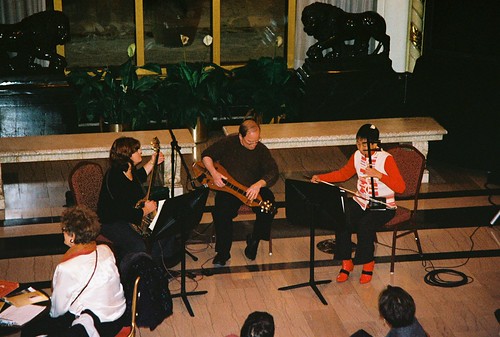
AppalAsia is one of those experiments that happens when musicians from different backgrounds decide to try something different. In this case traditional chinese instruments along with Appalachian folk instruments. Mimi played the Erhu (chinese instrument with bow drawn across strings), Jeffwas on the lap dulcimer and Sue played banjo. What came out was something like jazz, where the players listen to each other and adapt. Each hearing the others play, reacting to the quality of the music each was producing and adapting their own playing to it. It would be unfair to call the music chinese, or Appalachian, it was a hybrid of the two, done in the traditions of jazz.

Prior to performing each piece, composer/conductor John Adams introduced the pieces. There were two pieces, selections from the opera Nixon in China, and the Dr Atomic Symphony. What does it mean for a composer to introduce his own work? We get to hear why the piece was written, what he was thinking when he wrote the piece, and the flow of the piece. So, for Nixon in China we know the attitudes of the principle parts, the setting of the Nixon's arriving and being greeted, how Nixon is not paying attention while in the greeting line, of Mao reminiscing, of Chiang's imperiousness, and Chou's introspection.
Before Dr Atomic, John Adams introduction gave us something more, he let us know what voices various parts of the orchestra were taking on. The aggressive General, the Tewa Indian maid, the panic of the storm, and Dr. Oppenheimer's anguish over what is being unleashed on the world.
Why the story? Most of the pieces in the classical canon are not so tied to recent history, even the recent history of when they were written. In John Adams case, not just with these pieces, but with topics such as terrorist attacks on cruise ships and the 2001 World Trade Center attacks Adams directly referred to the potential reaction to these sometimes raw topics in his introduction to "Nixon in China" as being an "opera for Republicans and Communists." But he also said during his introduction to Dr. Atomic Symphony was that he writes about the history he has lived, and these were the big events, the cold war with its specter of atomic death and the rise of terrorism, the interconnectedness of globalization, the rise of America's impact on the world, and the times of transition we are in now as others have grown in the world America had nurtured.
I wonder if it is an American trait to do this sort of introspection. In Nixon in China the third act has the Nixon's talking about the most mundane aspects of being witness to history, while Mao and Chiang focus on how they overcame hardship in their struggle in the birth of Communist China. And our artists write works such as this, casting the mighty and powerful as dealing with the mundane, a contrast to the recent grandour of the presentation of the last Summer Olympics in Beijing. (not that there are not over the top representations of America, but the American desire to look at the greatest of figures as mundane and earthy seems different.)
My wife has remarked that living life together is like living a history book, touched by war, natural disasters, the thrill of a political campaign. And it is history from a mundane level, not the glorious stories of heroes (although there are many such), but people, responding in the positions they are in, in the good and the bad. Like John Adams, in my own little way, I appreciate the opportunities to remember and record the history around us. And maybe tell stories in years to come.
No comments:
Post a Comment